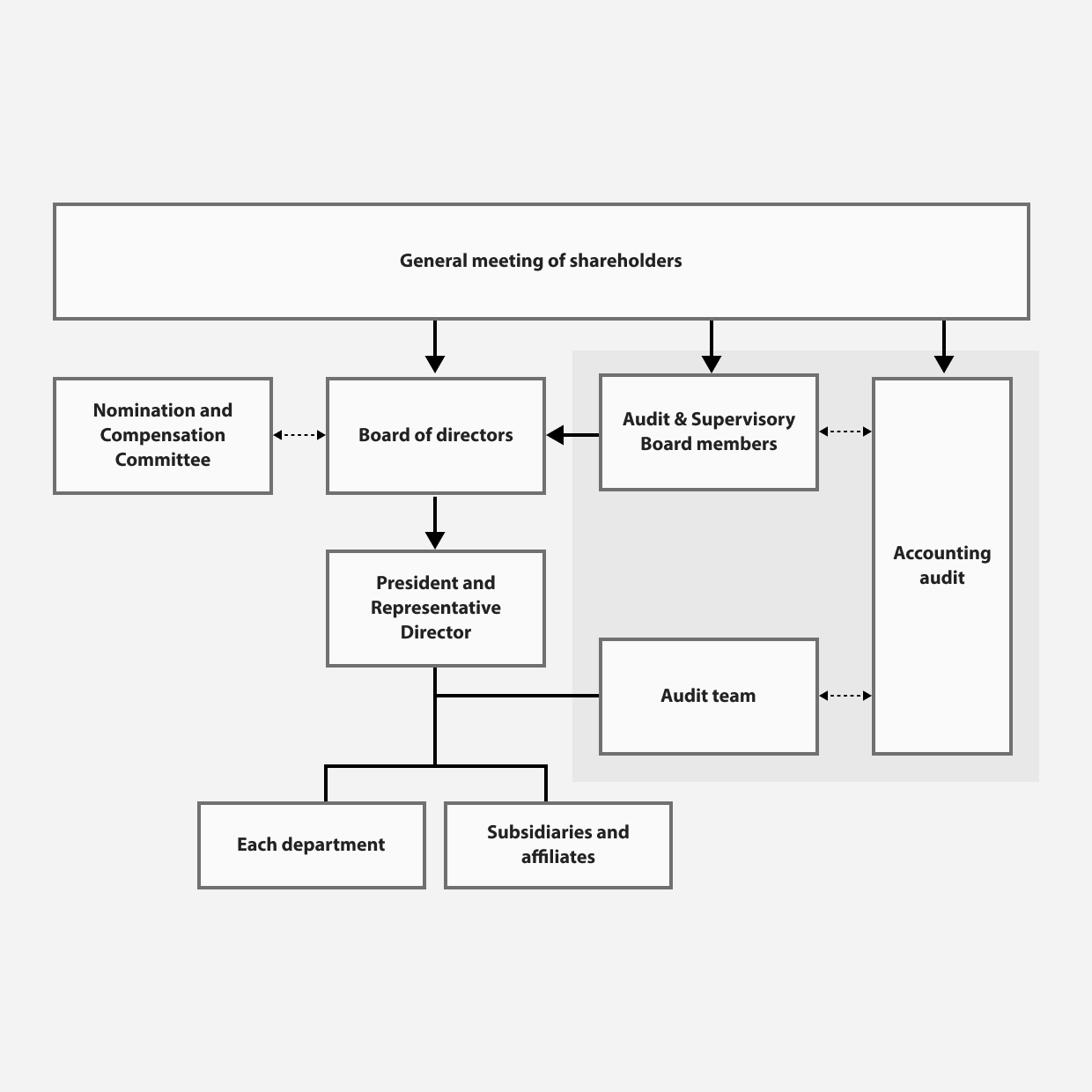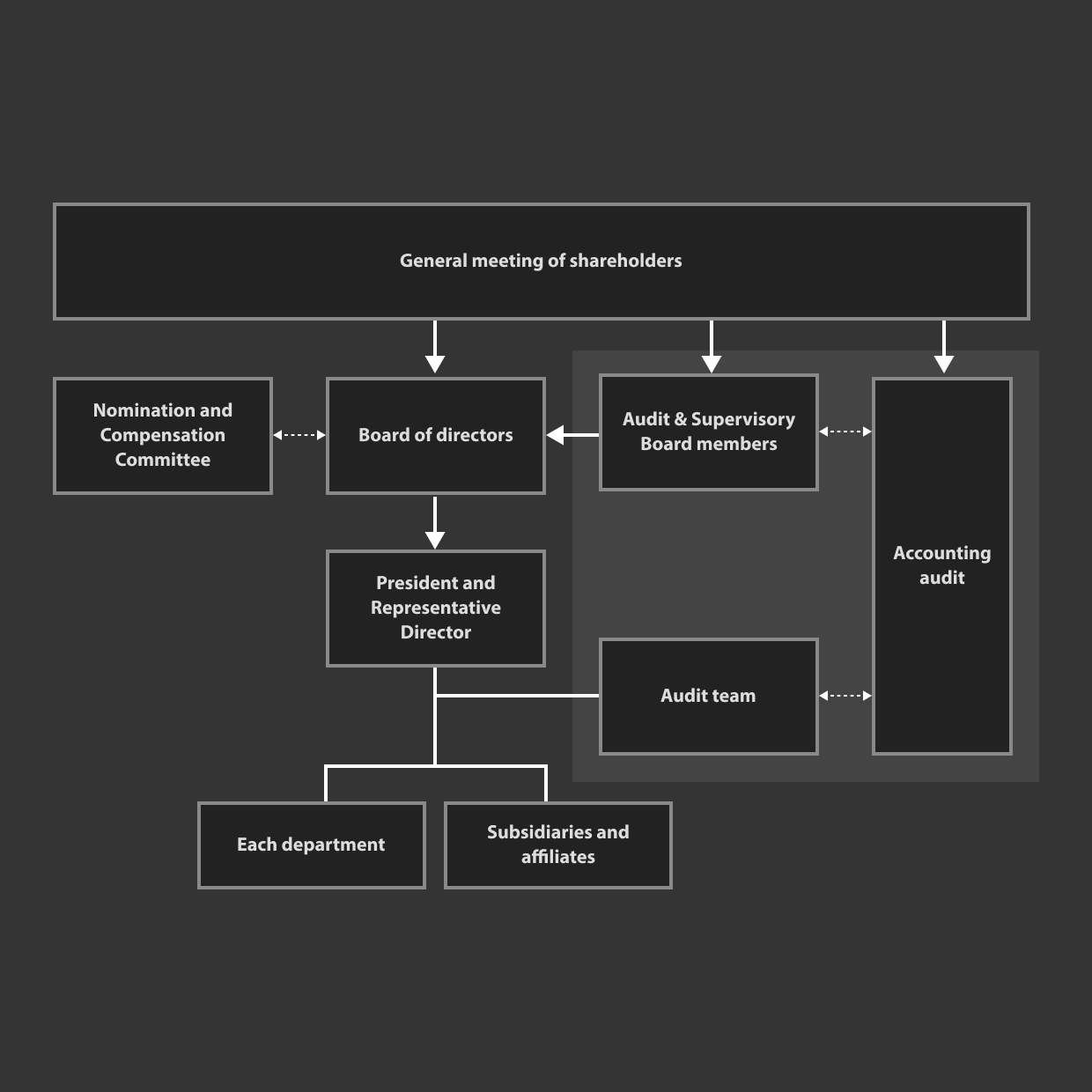Basic Guideline of Corporate Governance
To ensure lasting and sustainable growth of the company, the Group places importance on making swift and appropriate management decisions based on the corporate management philosophy and action guidelines, and strives to further enhance corporate governance continuously.
Corporate Governance System
Our corporate governance system uses an auditor system with three outside auditors. The corporate auditors do not have any full-time KEYENCE staff. The audit team works together and the corporate auditors attend various important company meetings. Meanwhile, the number of directors is nine, including three outside directors, which enables quick and thorough information exchange to achieve both supervision and execution.
We are building an internal control system where on-site audits are performed by a special department, information is quickly transmitted and a check function is implemented. The following is an overview of the corporate governance system and the business management organization for management decision-making, execution and supervision.

Policy on Nomination and Dismissal of Candidates for the Board of Directors
In nominating candidates for directors and corporate auditors, we require that candidates for directors be able to make sound andrational judgments, have high ethical standards, and be law-abiding, the internal director candidates must have a wealth of knowledgeand experience in the company’s business operations and excellent foresight. The external director candidates must have a wealth ofknowledge and experience in their home fields and the qualifications to advise and supervise the execution of management’s dutiesfrom an independent and objective standpoint. The candidate for corporate auditor should have a wide range of knowledge inaccounting, finance, and legal matters, and should be able to conduct audits from a neutral and objective perspective, therebycontributing to ensuring sound management.
Nominations of candidates for directors and corporate auditors are deliberated by theNomination and Compensation Committee in light of this policy, and are approved by the Board of Directors after receiving thecommittee’s report. In dismissing a director who is not performing their functions adequately, the Board of Directors will make acomprehensive decision on the proposed dismissal based on the opinion of the Nomination and Compensation Committee.Dismissal of directors and corporate auditors shall be conducted in accordance with the provisions of the Companies Act and otherrelevant laws.
Directors’ Compensation
Basic Approach to Compensation
KEYENCE’s basic approach to the compensation of directors (excluding that of outside directors) is as indicated below.
- It should clarify the management team’s responsibility for management, with the goal of improving corporate value.
- It contributes to incentives to improve company performance.
- The process for determining compensation should be both transparent and objective.
Method of Determining Compensation and Policies
We have laid out a policy whereby the amount of compensation, etc., and the method of calculating such amount, are determined based on the internal regulations on director compensation, over which the Board of Directors has decision-making authority. The Board of Directors determines the amount of compensation, etc. within the limits on compensation amounts deliberated upon at the General Meeting of Shareholders. The compensation amount is calculated based on a reference value equivalent to the annual salary of an employee (an officer responsible for an organization) in the previous fiscal year. The level of compensation is determined by multiplying this reference value by a coefficient of no greater than 3.0, in consideration of the balance with the salaries of KEYENCE employees. The annual salary of an employee in the previous fiscal year that is used as a reference value is tied with company performance (operating income), and the responsibility to increase profits is thus made clear. The ratio of the performance-linked portion of the reference value is generally 60–75%. The compensation amount for each individual director is, based on a resolution of the Board of Directors, first entrusted to the President and Representative Director, who then determines the apportionment of compensation in accordance with the internal regulations on director compensation, and then the determined amount of compensation is paid out to each director as a monthly salary. The compensation for outside directors, in order to ensure their independence, is not connected to company performance, and consists of a set value.
Building a Disciplined Organization
Employee Code of Conduct
To maintain an organization that is less prone to fraud and harassment, we have built and operate a system where all employees regularly review the corporate policies and business guidelines that form our code of conduct. In addition, by actively using this code of conduct as the judgment criteria in our daily business, we are working to ensure thorough compliance and improve compliance awareness.
Internal Audit Team
An appointed audit team has been formed to conduct internal audits. The audit team conducts internal audits focusing on the appropriateness and effectiveness of business operations at locations in Japan and overseas. The audit results and other information are reported regularly and as required by the president.

Risk Management
Risk Management System
With regard to risks relating to compliance, the environment, natural disasters, quality control, and management of exports, the individual departments responsible for these matters establish rules and guidelines as required and designate individuals in charge of managing those risks. In addition to this, they organize training sessions and produce/distribute manuals. In the event of a need to address newly emerging risks, the individuals responsible for the relevant departments will make a report to the Board of Directors, and the risk management system will be amended.
Information Security
At KEYENCE, we handle important, confidential information, including customer information and information on our product development. Damage to the company and the loss of social credibility due to information leaks or illegal use of information pose a major risk. We are therefore doing our utmost to prevent these from occurring. We have established an information security policy and continue to strengthen both our ability to prevent external leaks of confidential information and our response to cyber attacks.
Information Security Measures
Basic Approach
Recognizing the growing importance of information security, to earn and maintain the trust of our customers, partners, and employees, we are continuously promoting initiatives to protect the information assets related to the products and services we provide.
Cybersecurity Measures and Risk Management
- Identification of and Development of Policies for Cybersecurity RisksWe assess the degree of cybersecurity threats and security risks across the entire KEYENCE Group and formulate highly effective response policies.
- Development of Systems to Address Cybersecurity RisksWe evaluate, implement, and operate mechanisms to detect and respond to cybersecurity threats and data breach risks.
- Implementation of the PDCA Cycle for Cybersecurity MeasuresWe regularly review and continuously improve our information security measures to ensure they are being properly implemented and remain aligned with the latest security environment.
Promotion Structure
We have established measures for both normal operations and emergency situations. During normal operations, the Security Measures Team promotes initiatives, and our SOC (Security Operation Center) continuously monitors and analyzes threats.
In an emergency situation, a response team (Security Team) is formed to promptly and appropriately resolve the situation, coordinating with external incident response teams when necessary.
Preparation Against External Attacks
- Information Gathering and Countermeasures by a Specialized TeamAfter gathering threat intelligence, including KEV (Known Exploited Vulnerabilities) and information from the Common Vulnerability Scoring System (CVSS), we take appropriate countermeasures as needed.
- Monitoring for External AttacksIn collaboration with specialized SOC institutions, we conduct continuous monitoring and take measures based on security ratings and assessments from external organizations.
- Third-Party EvaluationsWe conduct third-party evaluations based on standards such as NIST to assess the security status of our systems and implement improvements based on the results of those evaluations.
Information Security Protection
- We implement organizational, physical, and technical management measures to prevent information loss, alteration, and leakage.
- We provide education and training to officers and employees on the importance of information security and proper handling of information.
- In the event of an information leak or similar incident, we investigate the facts and causes, implement measures to prevent secondary damage, and take actions to prevent recurrence.
Security Education
- We conduct unannounced targeted email attack drills.
- We educate our employees on information security and conduct comprehension tests.
- We offer security training at the time of hiring and additional special training as needed.
- We issue employee notifications related to security measures as necessary.
Compliance
Anti-corruption efforts
The KEYENCE Group Code of Behavior declares that engaging in Bribery with government officials or any person equivalent thereto is prohibited.
KEYENCE Group and its Officers and Employees will comply with this policy, other related regulations and the anti-bribery laws of each country and region.
Compliance Structure
Compliance with Laws and Regulations
KEYENCE Group and its Officers and Employees will comply with this policy, other related regulations and the anti-bribery laws of each country and region, including the US Foreign Corrupt Practices Act, the 2010 UK Bribery Act, and the Japanese Unfair Competition Prevention Act.
Supervision by the Board of Directors
The Board of Directors appoints a Chief Compliance Officer (CCO) as the person responsible for overseeing issues such as corporate ethics and Bribery.
Internal Reporting
We will establish and operate an internal reporting system (i.e., a whistleblower hotline) to allow employees to report violations of laws and regulations, including Bribery. Whistleblowers will not be subject to adverse treatment for making a report.
Basic Policy on the Prevention of Bribery and Corrupt Practices (PDF)
